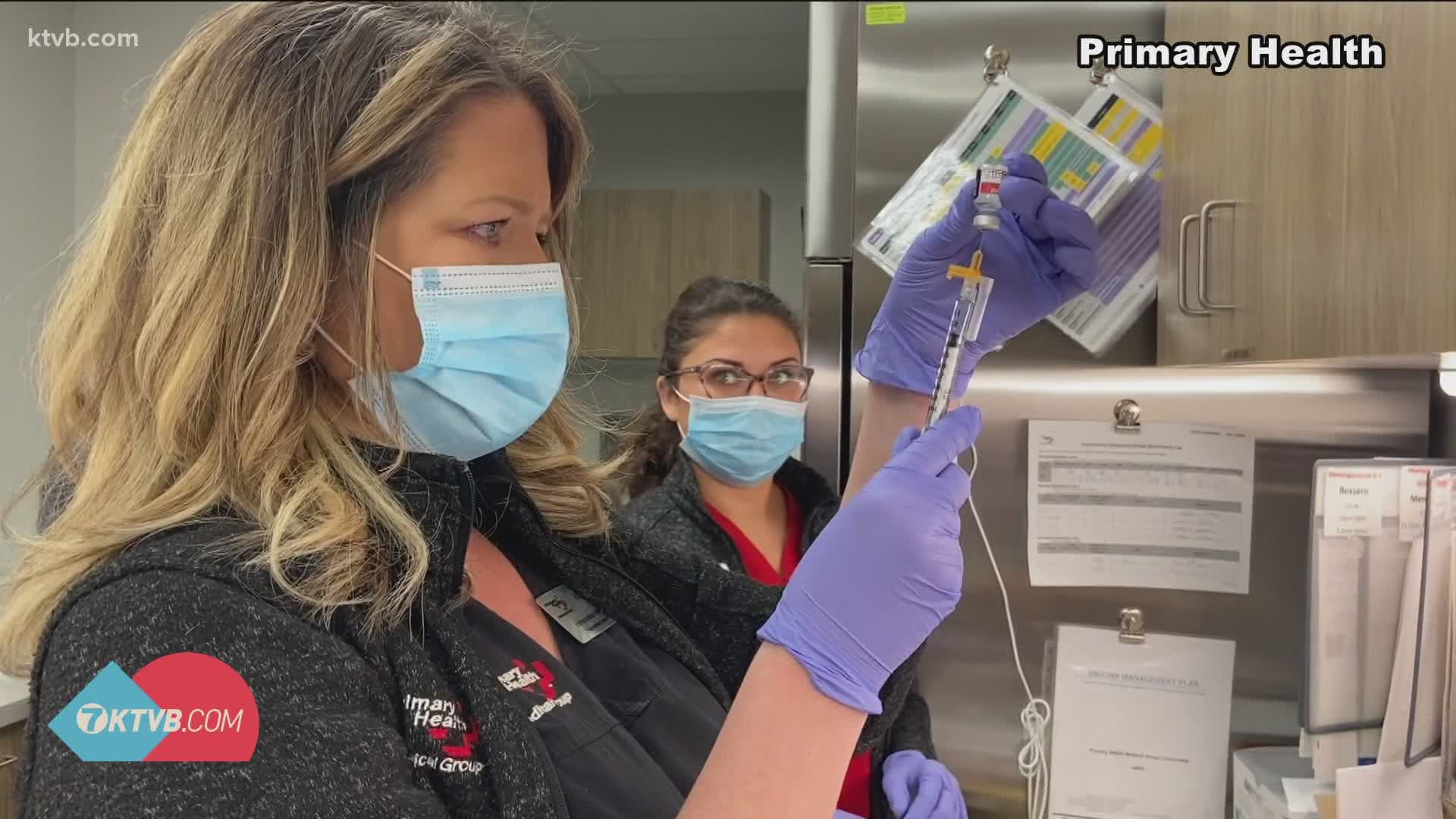BOISE, Idaho — Editor's note: This story has been updated since it was originally published to include information at the end about St. Luke's, where nearly 80% of employees have received the vaccine.
COVID vaccines were first available in the United States back in December. The first person to get one was a nurse in Long Island, New York.
The first person to get the vaccine in Idaho was a doctor in Madison County.
Seems logical since health care workers work on the frontlines with COVID patients and that put them at higher risk of contracting the virus.
So, you would think all health care workers would then fall in line and hurry to get their shots. But that hasn't been the case.
According to a Washington Post-Kaiser Family Foundation poll, only 52 percent of health care workers across the country have gotten their first dose, and more than 33 percent say they're not confident that the vaccines were adequately tested.
So what’s the solution?
For some hospitals around the country it’s simple: they've chosen to make the vaccines mandatory. But that hasn't happened in Idaho. At least not yet.
KTVB spoke with some of Idaho's largest health care providers to ask this question: are our health care professionals getting the vaccine?
“How can you not be vaccinated if you are a doctor or a nurse?” Dr. David Peterman said.
Peterman is the CEO of Primary Health Medical Group. He says about 30 percent of his staff are not vaccinated.
“Given that this vaccine has been given to billions, billions of people all around the world with very few side effects and incredibly effective, it is hard for me to understand why any health care worker, unless they have a medical reason, wouldn't be vaccinated,” Peterman said.
Health care workers are humans too, with their own set of beliefs, but when they're the ones who are promoting getting vaccinated since it first became available, it may come as a surprise that even some of them are vaccine hesitant.
“I understand that there is some hesitancy among people in the United States and some health care workers, but it's hard for me to understand that when all of us have been through the worst epidemic that any of us have ever seen. I have never encountered the kind of politics that have surrounded this disease,”
Katy Quinn, safety officer and COVD-19 incident commander at Saint Alphonsus, says about 70 percent their health care workers are vaccinated.
“Would you say you are surprised that this percentage isn't a little bit higher?” asked KTVB.
“Not necessarily, I think our colleagues are really like a small community, where you would have a percentage who actively wanted to be vaccinated, the first day they could obtain it based off of the priority group they fell in and we have others who wanted to talk to their provider or get some more information,” Quinn said.
She says just like the general population, health care workers may have personal situations that make them deeply consider getting vaccinated.
“We have pregnant colleagues or have people with health conditions where they really are working with their providers on what the best course of action is in regard to the COVID vaccine,” Quinn said.
Both Peterman and Quinn agree that the best approach to getting more staff vaccinated is education, for now.
“It’s so nuanced now depending on the individual's circumstances, which is why we are really trying to hit every piece of the puzzle of what people are thinking about,” she said.
But sooner rather than later, Peterman says making the COVID vaccine a requirement for staff could be a reality for some medical providers, including Primary Health. He says it is more likely to happen once the FDA removes the emergency use authorization and gives the vaccines full approval.
“When you mandate getting a COVID vaccine for your employees, do you think you are going to lose some of them?” asked KTVB.
“Yes, and I feel very strongly in that, at Primary Health decisions as it relates to health care, protecting our physicians, protecting our staff, and we have a group that looks at the evidence then makes a recommendation and then we follow as policy, we do that with influenza vaccines, we do that and I am prepared to do that with COVID vaccine, and if that means that an employee wants to work somewhere else, then I support that,” Peterman said. "The obvious next step with coronavirus vaccine is to make it a requirement for health care workers."
The region's other major healthcare provider, St. Luke's, hasn't required employees to get the vaccine but has been encouraging it among employees, providers, patients and community members.
"We’re pleased almost 80% of our employees have opted on their own to receive the vaccine," said St. Luke’s Health System Public Relations Manager Anita Kissée. "
Join 'The 208' conversation:
- Text us at (208) 321-5614
- E-mail us at the208@ktvb.com
- Join our The 208 Facebook group: https://www.facebook.com/groups/the208KTVB/
- Follow us on Twitter: @the208KTVB or tweet #the208 and #SoIdaho
- Follow us on Instagram: @the208KTVB
- Bookmark our landing page: /the-208
- And we also turn each episode into a podcast on Podbean
- Still reading this list? We're on YouTube, too:

